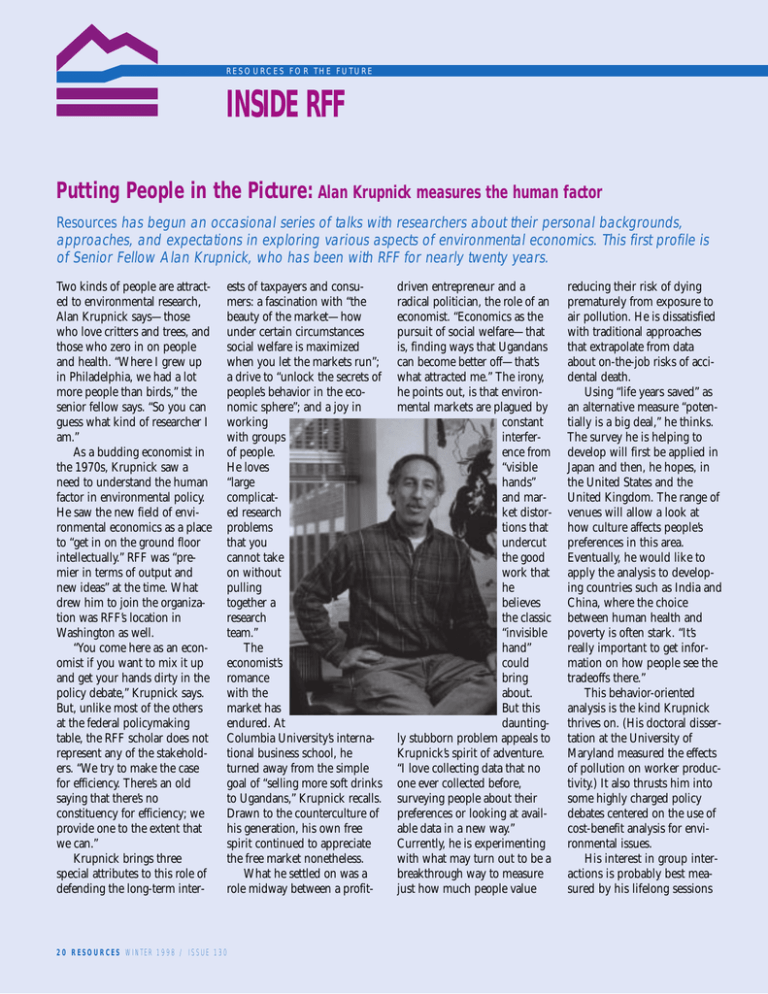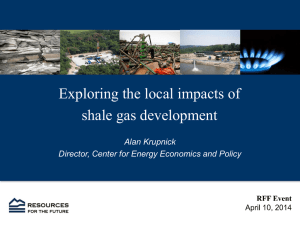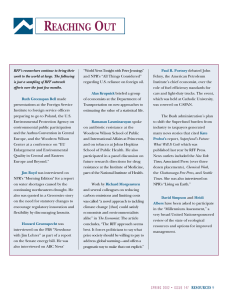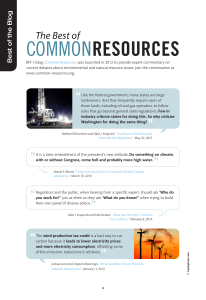INSIDE RFF
advertisement

RESOURCES FOR THE FUTURE INSIDE RFF Putting People in the Picture: Alan Krupnick measures the human factor Resources has begun an occasional series of talks with researchers about their personal backgrounds, approaches, and expectations in exploring various aspects of environmental economics. This first profile is of Senior Fellow Alan Krupnick, who has been with RFF for nearly twenty years. Two kinds of people are attracted to environmental research, Alan Krupnick says—those who love critters and trees, and those who zero in on people and health. “Where I grew up in Philadelphia, we had a lot more people than birds,” the senior fellow says. “So you can guess what kind of researcher I am.” As a budding economist in the 1970s, Krupnick saw a need to understand the human factor in environmental policy. He saw the new field of environmental economics as a place to “get in on the ground floor intellectually.” RFF was “premier in terms of output and new ideas” at the time. What drew him to join the organization was RFF’s location in Washington as well. “You come here as an economist if you want to mix it up and get your hands dirty in the policy debate,” Krupnick says. But, unlike most of the others at the federal policymaking table, the RFF scholar does not represent any of the stakeholders. “We try to make the case for efficiency. There’s an old saying that there’s no constituency for efficiency; we provide one to the extent that we can.” Krupnick brings three special attributes to this role of defending the long-term inter- ests of taxpayers and consumers: a fascination with “the beauty of the market—how under certain circumstances social welfare is maximized when you let the markets run”; a drive to “unlock the secrets of people’s behavior in the economic sphere”; and a joy in working with groups of people. He loves “large complicated research problems that you cannot take on without pulling together a research team.” The economist’s romance with the market has endured. At Columbia University’s international business school, he turned away from the simple goal of “selling more soft drinks to Ugandans,” Krupnick recalls. Drawn to the counterculture of his generation, his own free spirit continued to appreciate the free market nonetheless. What he settled on was a role midway between a profit- 20 RESOURCES WINTER 1998 / ISSUE 130 driven entrepreneur and a radical politician, the role of an economist. “Economics as the pursuit of social welfare—that is, finding ways that Ugandans can become better off—that’s what attracted me.” The irony, he points out, is that environmental markets are plagued by constant interference from “visible hands” and market distortions that undercut the good work that he believes the classic “invisible hand” could bring about. But this dauntingly stubborn problem appeals to Krupnick’s spirit of adventure. “I love collecting data that no one ever collected before, surveying people about their preferences or looking at available data in a new way.” Currently, he is experimenting with what may turn out to be a breakthrough way to measure just how much people value reducing their risk of dying prematurely from exposure to air pollution. He is dissatisfied with traditional approaches that extrapolate from data about on-the-job risks of accidental death. Using “life years saved” as an alternative measure “potentially is a big deal,” he thinks. The survey he is helping to develop will first be applied in Japan and then, he hopes, in the United States and the United Kingdom. The range of venues will allow a look at how culture affects people’s preferences in this area. Eventually, he would like to apply the analysis to developing countries such as India and China, where the choice between human health and poverty is often stark. “It’s really important to get information on how people see the tradeoffs there.” This behavior-oriented analysis is the kind Krupnick thrives on. (His doctoral dissertation at the University of Maryland measured the effects of pollution on worker productivity.) It also thrusts him into some highly charged policy debates centered on the use of cost-benefit analysis for environmental issues. His interest in group interactions is probably best measured by his lifelong sessions Newly promoted fellow Robert Hersh received a promotion to the rank of fellow in RFF’s Center for Risk Management this past fall. Until his promotion, Hersh was a research associate with the center, where he began working in 1992. An analyst of integrated pollution control initiatives on an international level, Hersh has also been examining the policy implications of incorporating land use into cleanup In the groove at Penn State, 1966. Alan’s the fifth “guy” at right. at the keyboard. Ever since his undergraduate days at Penn State, he has loved playing music—and still does, be it with his two young daughters at home, with aging professionals in lounge-lizard gigs on weekends, or as an accompanist for some of his neighbors in a community whose musical lights range from accordion to zither players with opera singers in between. There is not that much difference hearing him talk about these music gigs and about various policy “jam sessions” during his time at the White House Council of Economic Advisers—or his work currently as the cochair, and the lone economist, on an orchestra-sized federal advisory subcommittee. What he likes about RFF, Krupnick says, is that, unlike the isolation of many academic settings, it is well populated with scholars ready to “mix it up.” decisions at Superfund sites and is a primary author of the RFF report, “Linking Land Use and Superfund Cleanups: Unchartered Territory.” Hersh holds an M.A. in urban and environmental policy from Tufts University, a certificate in environmental management from the United Nations Environment Program, an M.A. in telecommunication arts from the University of Michigan, and a B.A. in English literature from the University of Sussex. He received a United Nations Environment Program Fellowship in 1991. He is also a recipient of the University of Michigan’s Leland Stowe Journalism Award and its Leo Burnett Scholarship for research in visual communication. New development director Evita Sherman-Dixon is RFF’s new director of development. . Before joining RFF, Sherman-Dixon was a major gifts officer for the Johns Hopkins University’s Zanvyl Krieger School of Arts and Sciences. Her experience also includes a series of positions with United Way, the most recent of which was as vice president for major/planned gifts at United Way Central Maryland. Sherman-Dixon holds a B.A. in international relations and Latin American studies from the American University. She replaces RFF’s former development director, Nancy Hiles. Photo credits: Patrick Deason Photography WINTER 1998 / ISSUE 130 RESOURCES 21





